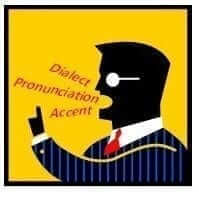
Difference between dialect and accent
Dialects and accents are two things people tend to confuse. They’re not interchangeable and quite different. Dialects can involve localized words and different expressions while accents are purely pronunciation and sound.
Dialect
A dialect is a particular way of talking that is intrinsic to a town or a part of a country and it involves the use of distinctive patterns, grammar and vocabulary. A person’s use of particular words and phrases can be an interesting way of finding out or inquisitively testing one’s knowledge of where they might come from.
An example of the use of different types of vocabulary would be how the Scottish say wee and bonny instead of little and pretty, respectively. Another example of how the Scottish dialect affects English grammar would be in their vocabulary; one such example of this is when they say, I dinna ken instead of I don’t know.
Accent
Accents are only concerned with pronunciation and not with vocabulary or grammar. The most important aspect of an accent is the particular sound used to create it.
There are common points between dialects and accents, in fact, both can tell us from which part of a country a person comes. However, they can change over time due to similar cultural connections and influences. A person’s accent and dialect really depends on where that person lives, and to whom they have spent time talking.
For instance, Scottish people have a distinct accent when they speak English, one of their native languages. Although they also have a dialect using variants of English words to mean other things. The same can be said for Australian people.
